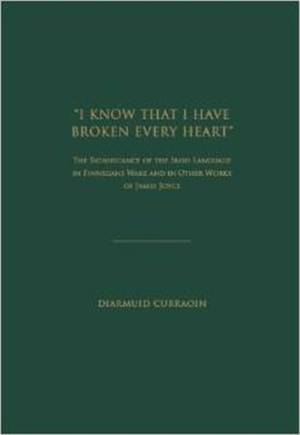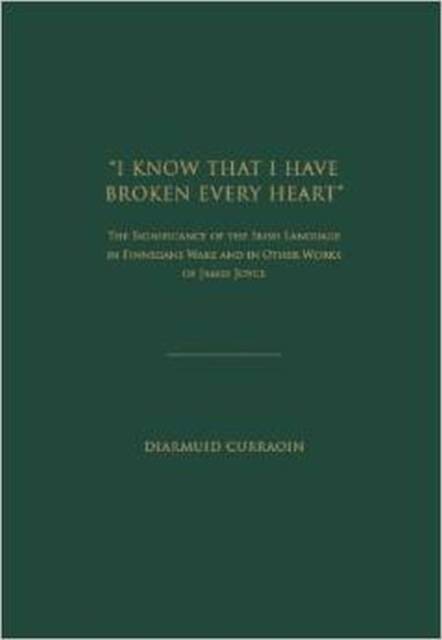
- Retrait gratuit dans votre magasin Club
- 7.000.000 titres dans notre catalogue
- Payer en toute sécurité
- Toujours un magasin près de chez vous
- Retrait gratuit dans votre magasin Club
- 7.000.0000 titres dans notre catalogue
- Payer en toute sécurité
- Toujours un magasin près de chez vous
I Know That I Have Broken Every Heart
The Significance of the Irish Language in "Finnegan's Wake" and in Other Works of James Joyce
Diarmuid Curraoin
50,45 €
+ 100 points
Description
The central theme of this monograph is James Joyce's employment of the Irish language in 'Finnegans Wake', the virtuosity with which he makes use of the tongue, the understanding of its grammatical and syntactical subtleties which he reveals in the book and "the explanatory treasure of heart and mind", as the the author put it himself, which the Gaelic component of the writer's final word on the world provides. Since 'Finnegans Wake' cannot be viewed in total isolation from the greater Joycean canon, the interconnections between it and Joyce's other writings, both fictional and journalistic, will be examined as will his deployment of other languages, notably his use of that second 'Irish' language Hisperic or Hiberno-Latin. James Joyce's employment of the Irish language in 'Finnegans Wake' is an area of study upon which little serious scholarly work has been done prior to study, an extraordinary situation when one considers that, firstly, the author declares in the book Irish to be the second language of the 'Wake' and secondly, that there is hardly a page of the novel which does not contain at least one Irish language element, features which range from the simple and obvious to the extremely complex and obtuse. More importantly, in a sense, however, is the fact that it is in Irish in 'Finnegans Wake' that the writer reveals his deepest personal concerns, worries in regard to the illness of his daughter Lucia, the manner in which his lifestyle has impacted upon his wider family, the state in which Ireland finds herself and the way in which he is viewed at home. A complete understanding of James Joyce, author, father, Irishman, cannot be achieved in the absence of a full appreciation of his relationship with the Irish tongue. Table of Contents: 1. Finnegans Wake and the politics of space, time and the sub-conscious mind 2. The dream of the black panther-James Joyce and the struggle for national self- realisation 3. "I know that I have broken every heart"-The secret messages in Irish of Finnegans Wake 4. The little black rose- the Fenian and Red Branch mythic cycles in Finnegans Wake 5. The mythic and metaphysical Irish in the works of James Joyce 6. The sayings of the west - Finnegans Wake and the Hisperica Famina 7. "Faithful to herself" - James Joyce and questions of Irish linguistic identity 8. Less than lovers, more than friends - images of Ireland in Finnegans Wake
Spécifications
Parties prenantes
- Auteur(s) :
- Editeur:
Contenu
- Nombre de pages :
- 224
- Langue:
- Anglais
- Collection :
Caractéristiques
- EAN:
- 9781936320790
- Date de parution :
- 15-12-13
- Format:
- Livre relié
- Format numérique:
- Genaaid
- Dimensions :
- 152 mm x 231 mm
- Poids :
- 430 g

Les avis
Nous publions uniquement les avis qui respectent les conditions requises. Consultez nos conditions pour les avis.






